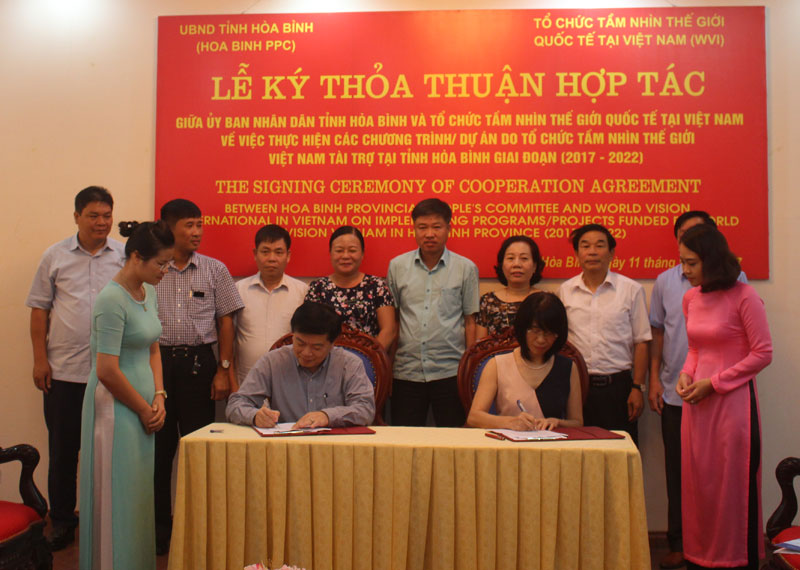
HBO – A cooperation agreement on implementing programmes/projects funded by World Vision Vietnam (WVV) in Hoa Binh province from 2017 – 2022 was signed on September 10 between the provincial People’s Committee of Hoa Binh province and World Vision Vietnam.
The
document was inked by Nguyen Van Chuong, Vice Chairman of the provincial
People’s Committee, and Tran Thi Thu Huyen, National Director of World Vision
Vietnam.

Nguyen Van Chuong, Vice Chairman of the Hoa
Binh People’s Committee, and Tran Thi Thu Huyen, National Director of World
Vision Vietnam, sign the cooperation agreement.
World Vision
Vietnamhas implemented numerous projects in Hoa Binh province since 2009, aiming to
help locals, have more opportunities to address shortcomings on knowledge,
skills, capital resources and management towards sustainable welfare for
children.
Currently, World Vision
Vietnamassists three regional development programmes in Yen Thuy, Mai Chau and Lac Son
with total aid commitments of 6,121,308 USD.
Under the 2017-2022 cooperation agreement, World Vision
Vietnam agrees
to join hands with the provincial People’s Committee to set up and implement regional
programmes, and promote cooperation with sectors to ensure regional programmes’
activities will provide best support possible for the implementation of local socio-economic
development plans. The organisation will seek different resources for the
regional programmes.
The provincial People’s Committee will approve WVV-funded programmes/projects,
and instruct relevant sectors, bodies, and districts to work closely with the
organisation in implementing the programmes/projects.
Hoa Binh will also assist the organisation with necessary administrative procedures,
including tax and and VAT exemption in accordance with the Vietnamese
government’s regulations.
The two sides also committed to implementing regional programmes according to
regulations on aid of non-foreign governmental organisations in
Vietnam.
The total estimated funding for the three regional programmes in Lac Son, Mai
Chau and Yen Thuy is over 4.8 million USD.
The agreement is carried out from October 1, 2017 – September 30, 2022.
Hoa Binh province is undergoing a dynamic transformation amid Vietnam’s national digital transition. Building on Poliburo’s Resolution No. 57-NQ/TW on breakthroughs in science, technology, innovation, and national digital transformation, the province has rolled out a wide range of practical action plans. A standout initiative is the "Digital Literacy for All” movement, an effort to ensure that no one is left behind in the digital era.
Hoa Binh province is undergoing a dynamic transformation in the wake of the national digital transformation movement. Building on Resolution No. 57-NQ/TW of the Politburo on breakthroughs in science, technology, innovation, and national digital transformation, the province has implemented a wide range of practical action plans. A standout initiative is the "Digital Literacy for All” movement ambitious effort to ensure that no one is left behind in the digital age.
With a spirit of unity and proactive problem-solving, the Party Committee, the government and the people of Dong Lai Commune (Tan Lac District) have made great strides in implementing the resolutions of the 24th Party Congress of the commune for the 2020 - 2025 term. Focusing on leadership and practical actions, the commune has brought the Party’s resolutions into daily life, creating strong impacts and pushing the local development forward.
Amid the nationwide push for digital transformation, young people in Hoa Binh Province are stepping up as dynamic pioneers, applying technology to enhance Youth Union operations and expand the reach of youth-led initiatives. Through creativity and adaptability, Youth Union organizations at all levels have introduced a series of practical solutions, contributing to modern governance and community development.
In recent years, An Nghia commune, located in Lac Son district, has stepped up administrative reform, focusing on improving the quality and efficiency of its single-window service unit for receiving and processing administrative procedures. These improvements have helped create favourable conditions for local residents and organisations to handle administrative procedures, contributing to the commune’s broader socio-economic development.
The Prime Minister-approved master plan to develop the multi-use value of forests ecosystems through 2030, with a vision to 2050, aims to improve the management and sustainable use of forest resources, create jobs, increase incomes, and improve the living standards of ethnic minorities, people in mountainous and remote areas, forest workers and those living near forests.



